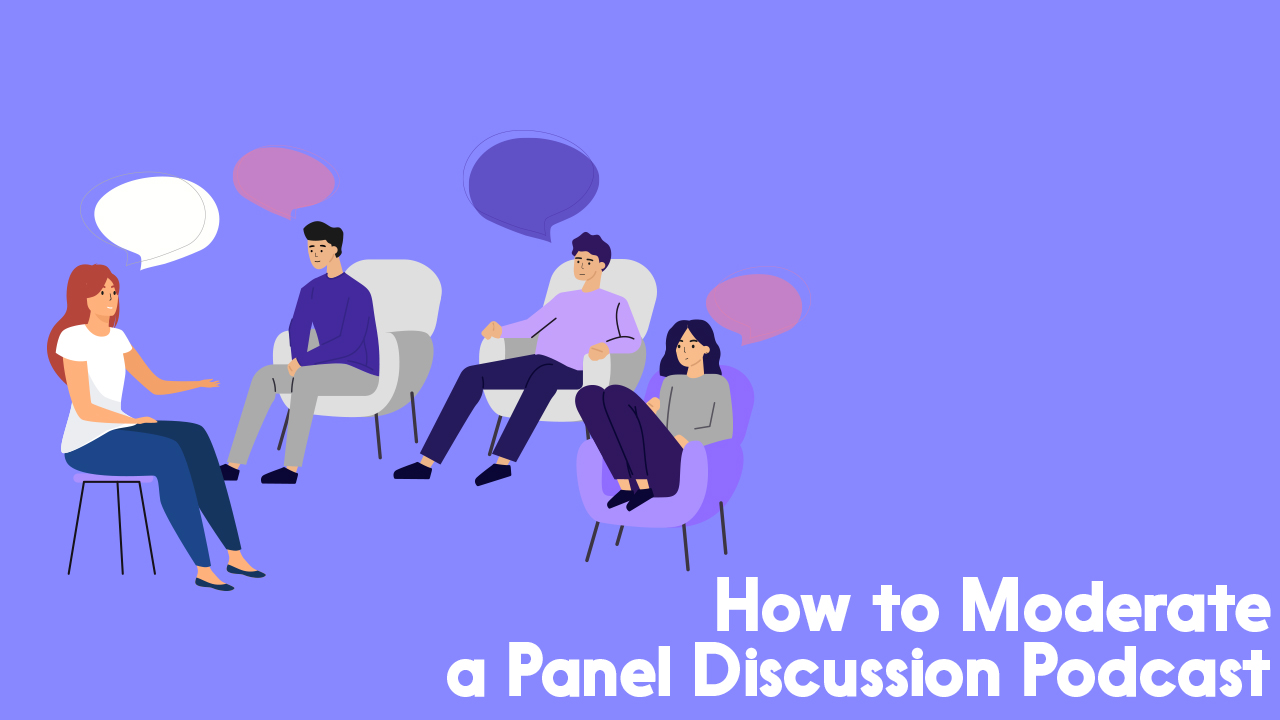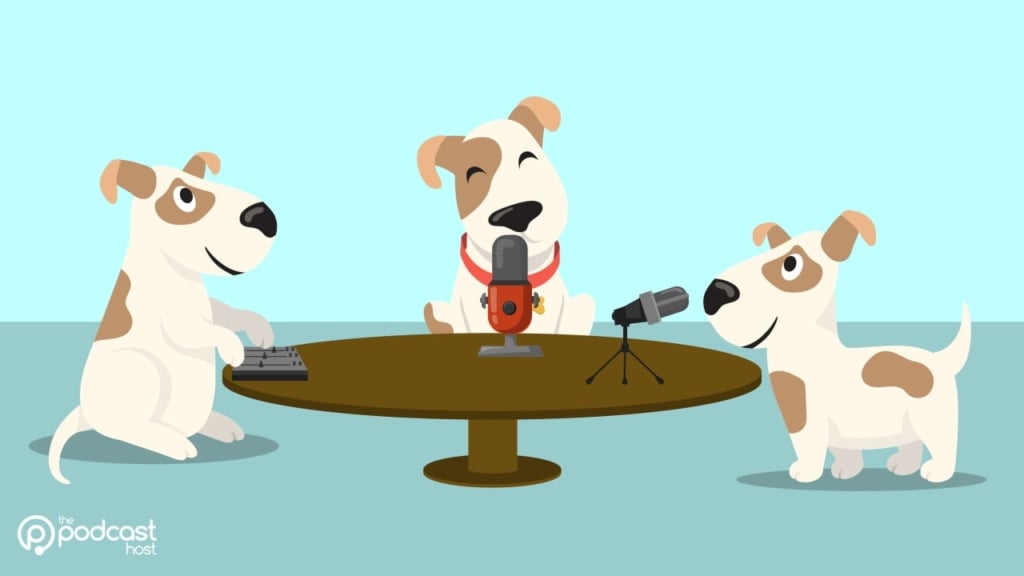How to Moderate a Panel Discussion Podcast

A popular podcast format, because of its history in news radio and TV, is the panel discussion podcast. These can range from a bunch of friends chatting about pop culture, to journalistic debates. To the uninitiated, this can seem as easy as having your friends round for drinks. However, running a panel discussion podcast requires skill in multiple arts. Not only should you be good at podcast production, but also at moderating group discussion.
You could simply turn on microphones in front of your friends, hit record, and hope for the best. If you’re lucky, you could end up recording a conversation that’s interesting to others. At worst, you could end up with a nonsensical recording, and some angry guests. Or, you could use tested strategies to bring out the best in your podcast guests, and elevate the conversation. Let’s look at some best practices for how to moderate a panel discussion podcast.
Recording a Panel Discussion Podcast
The options for recording a panel discussion podcast are more varied than you’d expect. Sometimes field recording gives you ambience and verisimilitude that increases immediacy. Other times, you might want nothing to distract the listeners from your guests’ voices.
If you and your guests are all in separate locations, you can use call recording software, such as our own tool, Alitu. This can also clean up your recordings and even help you publish them. But if you simply want raw recordings to edit, upload and publish yourself, there are many call recording apps you can use, such as Squadcast, Riverside, Ringr, Cleanfeed, or Zoom.
Your guests will only sound as good as their sound equipment lets them. If your guests use their computer’s built-in microphone and speakers, the mic will pick up all of the room noise, including what the computer generates, and feeds back. Irritating noises or echo can waste a lot of time and effort. Since more people work from home or use online meeting software, a lot of people either have (or are planning to buy) a headset mic. if they’re used to participating in podcasts, they’ve probably already got a basic podcast setup. Communicate with your guests ahead of schedule. Ask what kind of microphone and headphones they have, and make sure they’re comfortable with them.
If you and your panel discussion guests will record together in the same room, you may want to invest in the Zoom PodTrak P4. This is a really popular piece of equipment, and with good reason. Our full review can show you how this podcast recorder lives at the intersection of price and flexibility. Also, our guide to digital recorders can help you record multiple guests almost anywhere. Always make sure everything is fully charged, and that you back up your audio recordings.
Let each person do a soundcheck in their normal speaking voice, sitting comfortably. This can help them get over mic fright before you start recording.
Moderating the Panel Discussion Podcast
It’s entirely possible to sit down with a few brilliant folks, and not know where to begin. Our Great Interview Questions resource can help you come up with some questions. You want to introduce your panel discussion guests, stating their areas of expertise. Unless it’s immediately obvious, you want the listeners to know how their experience and skills relate to the discussion topic. If you’ll be discussing meditation, for example, and one of your panellists runs a five-star restaurant, the panellist should be able to briefly tie in how their culinary and business management experience taught them something about meditation.
How do you keep this from turning into people saying, “I don’t care what anyone else thinks, I only want to promote my book /business /podcast /pet cause?” I asked my colleague Bobbi Block for some advice, and she gave me a whole guide. Bobbi is an Experiential Facilitator and Coach, with a unique background in both Learning & Development and the performing arts. Her years teaching busy executives how to express themselves more productively makes her the right source of best practices for moderating a panel discussion podcast.
Pre-Event Ground Rules
Before the panel discussion podcast starts recording, make all participants aware of any Ground Rules. Be sure they understand that you are the moderator, and ask for their agreement to yield to your leadership and facilitation. Let them know about any time limits or rules about when and how to ‘chime in,’ versus when to wait to be invited in (this all depends on the looseness and ‘feel’ of your particular format). Ground rules also include language around what type of speech will not be tolerated.
Make Space
There are often two types of participants: those who have no trouble getting their voice heard, and those who either prefer to listen (not speak) or don’t possess the assertiveness skills to make their voice heard. So that’s where the facilitator comes in.
Keep a keen eye on what’s happening in the moment (instead of focusing on your next question!). Notice who is dominating and who has not been heard. Be sure to create space for unheard voices by directly inviting them into the conversation. Do not tell the others ‘we’ve heard enough from you’ — rather, simply focus on the others, and invite them to add more.
Model Transparency
To get a good conversation going, you must create psychological safety. In this format, you can do so by revealing your own truths, your own opinions, or something surprising or vulnerable. Your vulnerability paves the way for others to feel safe doing the same. This will result in richer discussion.
Know the Style of Your Panelists and Your Audience
Everyone has different styles. Some of your panellists will offer a ton of details before getting to the main point. Others will give you the main point without providing any details of how they got there. Understand them and understand what your audience needs to hear.
If your audience will grow weary of too much analysis, steer the detail-personality to provide the bottom line. If your audience will not be satisfied with big-picture generalizations, steer the bottom-line personality to provide the answers to the 5 Ws. You will be doing a great service to meet your audience’s listening needs.
Acknowledge
Be sure to acknowledge the input of others before moving on to something else. Everyone wants to feel heard. The more one feels heard, the more likely one will contribute further. Take the time to either reflect back on part of what you just heard or simply thank them for their thoughtful response.

How Do You Record the Podcast and Moderate Discussion at the Same Time?
Like I said before, this can be like conducting an orchestra while cooking omelettes. You may want to have a good podcaster friend be your sound engineer while you moderate the discussion. If that’s not possible, take time before your guests arrive to make sure that all your recording levels and settings are ready. If people are raising their voices, pay more attention to your guests and how the discussion is going. Plan ahead for good sound, and you can clean up in the editing stage, later. Emotions and reputations are more difficult to fix.
As Bobbi said, plan some extra time at the beginning to let your guests know your expectations. Again, make sure you have a sound check, and let them get comfortable with the recording gear.
Respect and Knowledge Always Outweigh Ego.
If you know your podcast’s topic inside and out, and are comfortable with recording, the only issue that remains to moderate a panel discussion podcast is to make sure that everyone is relaxed and respectful. If everyone there is invested in the topic and wants to promote it, you’ll all have a good time and help audiences in the bargain.
Again, Alitu can set you up for success with its call recording and editing tools. Plus, Podcraft Academy offers courses about every aspect of podcasting. There’s even a course-specific to getting the most out of the PodTrak 4. Our Weekly Live Q&A sessions can help you with any questions you might have. Join us!
